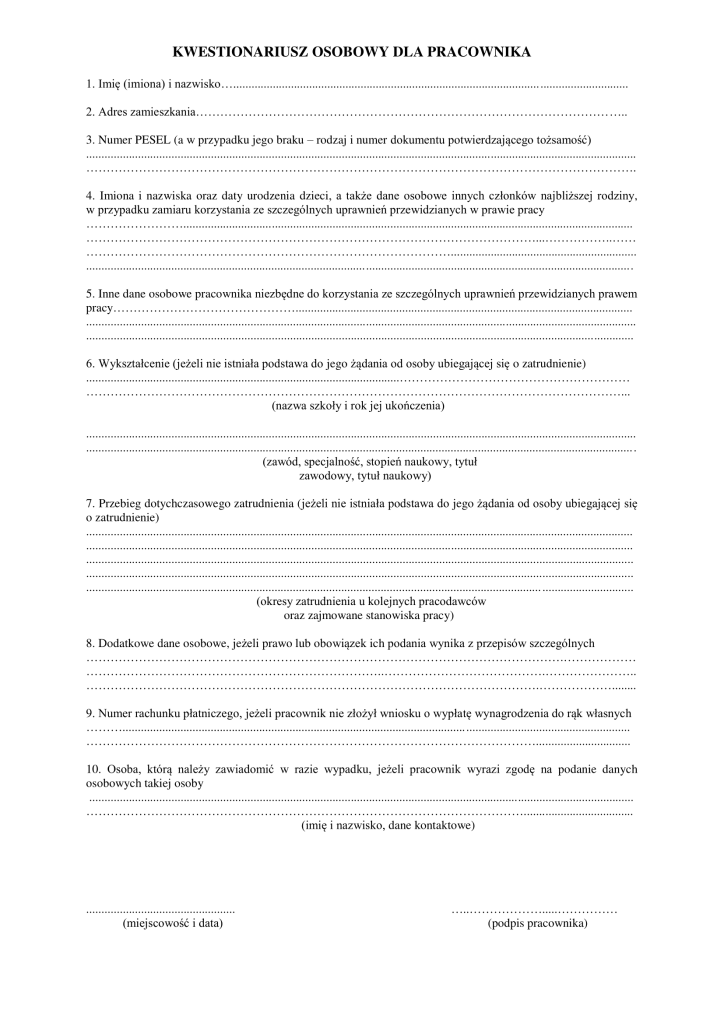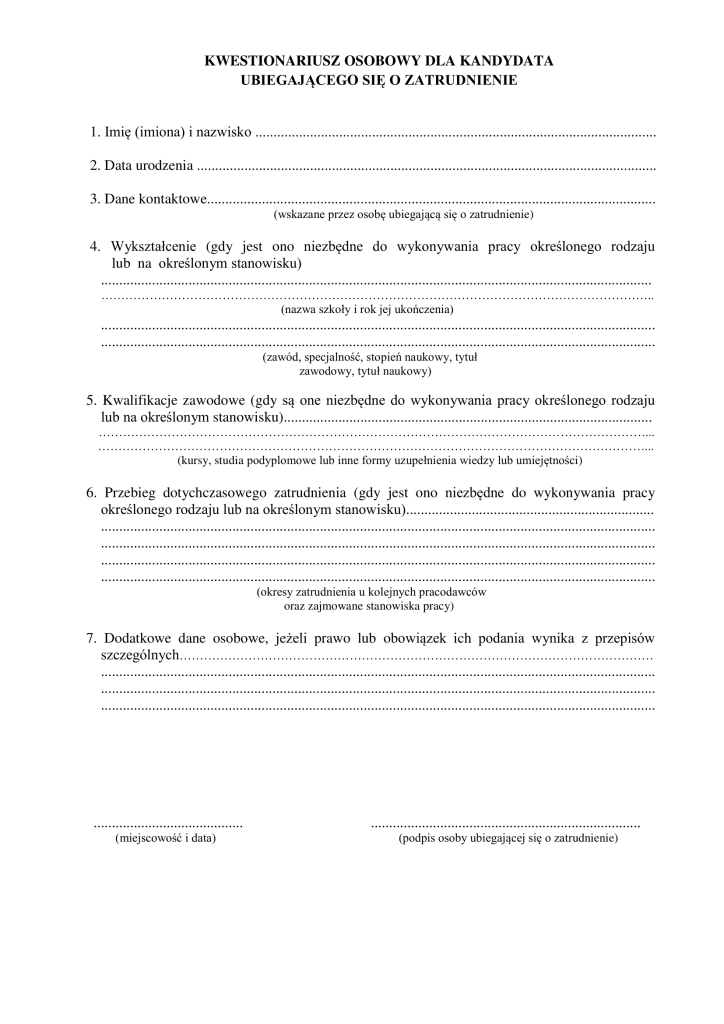Personal questionnaire – template, how to fill in?
TABLE OF CONTENTS:
- What is a personal questionnaire?
- Employee personal questionnaire – what data do you need to provide?
- Personal questionnaire and RODO
- Obligation to keep data up to date
- Retention of employee records
- What should an employer not ask?
- Employee questionnaire – how to complete?
- Personal questionnaire – template
Before taking up a job, the employer requires the applicant to provide certain data. The employee’s personal questionnaire is used for this. The data are needed to draw up an employment contract or a contract of commission. The data are most often also used to report the employee to the Social Security Office. How to fill in the personal questionnaire? What data should be entered in the personal questionnaire?

What is an employee personal questionnaire?
A personal questionnaire is a document that is a form of questionnaire that an employee has to fill in at the beginning of his or her work. Usually, this form is filled in before signing a contract of employment or a contract of commission. The employer requires certain personal data, which later goes into the employee’s file. The data is needed not only to draw up the contract, but also to report the employee to the Social Security Administration.
Employee personal questionnaire – what data do you need to provide?
The data to be included in the personal questionnaire can be divided into two types. Into those required by the Labour Code and those recommended by the Regulation of the Minister of Labour and Social Policy.
The Labour Code states that:
Article 221 § 5. Provision of personal data to the employer shall be made in the form of a statement by the data subject. The employer may request documentation of personal data (…) to the extent necessary to confirm it.
We can learn from the legislation that an employer may require the following data from an applicant for employment:
- name(s) of the applicant,
- date of birth,
Depending on the nature of the job, the employer may also ask for data such as:
- the candidate’s education,
- professional qualifications,
- foreign language skills,
- driving licence,
- employment history (e.g. in the CV).
On the other hand, more detailed data will be required from the person already hired:
- PESEL or NIP number of the employee,
- identity document number (if no PESEL number),
- bank account number (if no other form of remuneration is declared),
- data about the family, e.g. names of children (if they will benefit from a social package).
Data on family members may also be needed if the employee wishes to benefit from special entitlements. Information on children will be useful to increase the amount of time off for childcare or to obtain additional remuneration.
In specific cases, the employer may also ask for information as a result of a legal provision, e.g. information on nationality and criminal record.
Read also: How to write a CV?

Personal questionnaire and GDPR
On 25 May 2018, Regulation 2016/679 of the EU Parliament and of the Council of 27 April 2016 on the protection of natural persons with regard to the processing of personal data and on the free movement of such data and repealing Directive 95/46/EC (Official Journal of the EU L 119 of 4.05.2016) – or GDPR – was introduced.
The wording of the provisions that dealt with the sharing of personal data has changed. The GDPR Directive allows an employer to require a telephone number and email address in a personal questionnaire.
Obligation to keep data up to date
It is the employee’s responsibility to keep their data up to date whenever there is a change in their life. Failure to keep the data up to date may contribute to:
- the worker not being considered for benefits,
- non-receipt of income information,
- repercussions from tax and insurance authorities,
- non-receipt of employee entitlements.
Retention of employee records
Hiring a new employee involves the preparation of several necessary documents:
- employment contract/contract of employment,
- referral for examination,
- medical certificate,
- insurance notification,
- courses and training courses attended,
- qualifications required to perform the job
- personal questionnaire.
All these documents must be kept in the employee’s file.
In Article 94 of the Labour Code – the employer is obliged to keep employee records of all employees. As of 2019, it is possible to do so in electronic form. It makes it easier to store, update and secure the data.
According to the regulations, the employer must keep employee data for 10 years (if employed after 1999). The personnel files of employees hired earlier must be stored for 50 years.

Read also: How to write a cover letter?
What should an employer not ask?
The employer may only request work-related data. He or she may not ask for information concerning private life. The employee may refuse to provide information that is inconvenient for him/her. Please note that this is prohibited by law!
The RODO legislation is clear about what can and cannot be included in an employee’s personal questionnaire. An employer may not request from an employee data such as:
- parents’ names,
- place of residence
He cannot enter a person’s private sphere and ask about:
- sexual orientation,
- religious beliefs,
- marital status,
- state of health,
- whether a woman is planning a pregnancy.
Employee personal questionnaire – how to complete?
The employee’s personal questionnaire is usually completed by hand. It should be completed legibly, preferably in capital letters.
If you are not sure whether a field applies to you – do not fill it in. Make sure by asking the right person.

Read also: Bullying at work
Personal questionnaire – model
There are many templates for the employee personal questionnaire on the internet. However, it is best to use verified sites – these show up-to-date document templates. What should a sample personal questionnaire look like in 2023? We present below 👇
- Personal questionnaire for an employee MODEL

- Personal questionnaire for applicant for employment MODEL

A personal questionnaire is a document that an employer needs when hiring a new employee. It is a collection of the most necessary personal data. Remember that giving data to strangers is regulated by law. An employer cannot ask for your private information, unrelated to the nature of the job. You can then refuse to answer.
Check also: Electricity prices 2023
 Back
Back